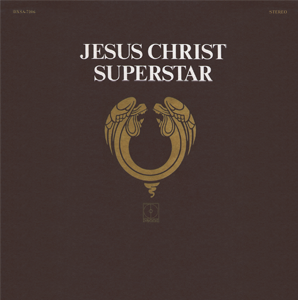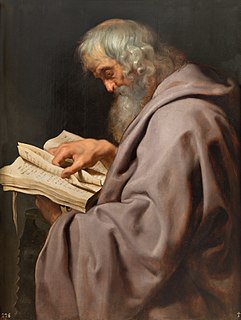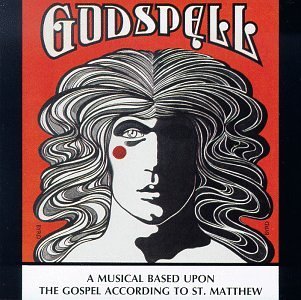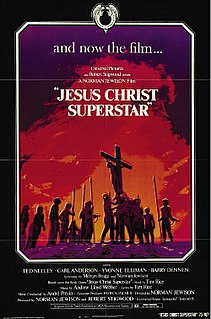Plot
The first act is set in Nazareth, where Jesus is a young man in his twenties, unhappy at his recent rejection by a local beauty named Rahab. Joseph is portrayed as a drunkard and a poor workman, and his relationship with Mary as difficult and often violent. A wealthy passing traveller called Judas arrives in search of a cabinet-maker's services; he and Jesus form a friendship, and set off together for Jerusalem at Judas' prompting.
The second act is set in Jerusalem some years later, after some marvels attributed to Jesus have happened. Judas and Jesus are still close friends, Barabbas appears as a thief preying on traders in the Temple, Mary Magdalene is Pilate's mistress and Saul one of his officers, and there is a dispute between Peter and John over who best observes their master's doctrines, but the manuscript breaks off before a resolution of these elements.

Mary of Bethany is a biblical figure mentioned only by name in the Gospel of John in the Christian New Testament. Together with her siblings Lazarus and Martha, she is described by John as living in the village of Bethany, a small village in Judaea to the south of the Mount of Olives near Jerusalem.

Judas Iscariot was a disciple and one of the original Twelve Apostles of Jesus Christ. According to all four canonical gospels, Judas betrayed Jesus to the Sanhedrin in the Garden of Gethsemane by kissing him and addressing him as "rabbi" to reveal his identity in the darkness to the crowd who had come to arrest him. His name is often used synonymously with betrayal or treason. Judas's epithet "Iscariot" most likely means he came from the village of Kerioth, but this explanation is not universally accepted and many other possibilities have been suggested.

Jesus Christ Superstar is a 1970 rock opera with music by Andrew Lloyd Webber and lyrics by Tim Rice. Initially unable to get backing for a stage production, the composers released it as a rock opera album musical. The success of the album led to the show's Broadway on-stage debut in 1971. The musical is sung-through, with no spoken dialogue. The story is loosely based on the Gospels' accounts of the last week of Jesus's life, beginning with the preparation for the arrival of Jesus and his disciples in Jerusalem and ending with the crucifixion. It depicts political and interpersonal struggles between Judas Iscariot and Jesus that are not present in the Bible.

The Oberammergau Passion Play is a passion play that has been performed every 10 years since 1634 by the inhabitants of the village of Oberammergau, Bavaria, Germany. It was written by Othmar Weis, J A Daisenberger, Otto Huber, Christian Stuckl, Rochus Dedler, Eugen Papst, Marcus Zwink, Ingrid H Shafer, and the inhabitants of Oberammergau, with music by Dedler. Since its first production it has been performed on open-air stages in the village. The text of the play is a composite of four distinct manuscripts dating from the 15th and 16th centuries.

James the Just, or a variation of James, brother of the Lord, was a brother of Jesus, according to the New Testament. He was an early leader of the Jerusalem Church of the Apostolic Age. He died as a martyr in AD 62 or 69.

Simon the Zealot or Simon the Canaanite or Simon the Canaanean was one of the most obscure among the apostles of Jesus. A few pseudepigraphical writings were connected to him, but Saint Jerome does not include him in De viris illustribus written between 392 and 393 AD.

Godspell is a musical composed by Stephen Schwartz with the book by John-Michael Tebelak. The show opened off-Broadway on May 17, 1971, and has since been produced by multiple touring companies and in many revivals. The 2011 revival played on Broadway from October 13, 2011, through June 24, 2012.

The Greatest Story Ever Told is a 1965 American epic film produced and directed by George Stevens. It is a retelling of the Biblical account about Jesus of Nazareth, from the Nativity through to the Ascension. Along with the ensemble cast, it is Claude Rains' final film role. It received five Academy Award nominations.

The New Testament describes James, Joseph (Joses), Judas (Jude), and Simon as brothers of Jesus. Also mentioned, but not named, are sisters of Jesus.

Jesus Barabbas is a figure mentioned in the New Testament, in which he is an insurrectionary held by the Roman governor at the same time as Jesus, and whom Pontius Pilate freed at the Passover feast in Jerusalem, while keeping Jesus as a prisoner.

The King of Kings is a 1927 American silent epic film produced and directed by Cecil B. DeMille. It depicts the last weeks of Jesus before his crucifixion and stars H. B. Warner in the lead role.
Corpus Christi is an experimental play by Terrence McNally dramatizing the story of Jesus and the Apostles, ultimately depicting Jesus and the Apostles as gay men living in modern-day Texas. It "follows a group of gay men who re-enact Christ's spiritual journey." Written in 1997 and first staged in New York in 1998, The portrayal of Jesus and the Apostles as gay men focuses Corpus Christi as a play that queers the narrative of Jesus and His Apostles. Corpus Christi is not only unique because of its narrative of Jesus’ life but also because of the way it tells the narrative. McNally arranges the narrative through anachronisms that represent Roman occupation.

Mark 14 is the fourteenth chapter of the Gospel of Mark in the New Testament of the Christian Bible. It contains the plot to kill Jesus, his anointing by a woman, the Last Supper, and his predictions of his betrayal and Peter's three denials of him. It then begins the Passion, with the garden of Gethsemane, Judas' betrayal and Jesus' arrest, followed by Jesus' trial before the Sanhedrin and Peter's three denials of Jesus.
The Miracle Maker is a 1999 British-Russian-American stop motion-animated film about the life of Jesus Christ, through the eyes of Tamar; the terminally ill daughter of Jairus, a priest in Capernaum. Hand-drawn animated cartoons are used to distinguish flashbacks, parables, stories, spiritual encounters and visions from the main plot, which is all in stop motion.

John 12 is the twelfth chapter of the Gospel of John in the New Testament of the Christian Bible. It narrates an anointing of Jesus' feet, attributed to Mary of Bethany, as well as a version of the triumphal entry of Jesus Christ into Jerusalem. The book containing this chapter is anonymous, but early Christian tradition uniformly affirmed that John composed this Gospel.

John 13 is the thirteenth chapter of the Gospel of John in the New Testament of the Christian Bible. The "latter half" or "closing part" of John's Gospel commences with this chapter. The nineteenth-century biblical commentator Alexander Maclaren calls it "the Holy of Holies of the New Testament" and the "most sacred part of the New Testament", as it begins John's record of the events on the last night before the crucifixion of Jesus Christ, emphasising Jesus' love for His disciples, demonstrated in the service of washing their feet, and His commandment that they love one another in the same way. The book containing this chapter is anonymous, but early Christian tradition uniformly affirmed that John composed this Gospel.

Jesus Christ Superstar is a 1973 American musical drama film directed by Norman Jewison and jointly written for the screen by Jewison and Melvyn Bragg; they based their screenplay on the 1970 rock opera of the same name, the libretto of which were written by Tim Rice and whose music was composed by Andrew Lloyd Webber. The film, featuring a cast of Ted Neeley, Carl Anderson, Yvonne Elliman, Barry Dennen, Bob Bingham, and Kurt Yaghjian, centers on the conflict between Judas and Jesus during the week of the crucifixion of Jesus.

The Last Temptation of Christ is a 1988 religious drama film directed by Martin Scorsese. Written by Paul Schrader with uncredited rewrites from Scorsese and Jay Cocks, the film is an adaptation of Nikos Kazantzakis' controversial 1955 novel The Last Temptation of Christ. The film, starring Willem Dafoe, Harvey Keitel, Barbara Hershey, Andre Gregory, Harry Dean Stanton and David Bowie, was shot entirely in Morocco.

Son of God is a 2014 American epic biblical film directed by Christopher Spencer, and produced by Mark Burnett and Roma Downey. The film retells the life of Jesus and is an adaptation of the ten-hour miniseries The Bible, which aired in March 2013 on the History channel, and immediately following the movie begins another TV series called A.D. The Bible Continues.

Acts 1 is the first chapter of the Acts of the Apostles in the New Testament of the Christian Bible. The book containing this chapter is anonymous but early Christian tradition affirmed that Luke composed this book as well as the Gospel of Luke. This chapter functions as a transition from the "former account" with a narrative prelude, repeated record of the ascension of Jesus Christ with more detail and the meeting of Jesus' followers, until before Pentecost.


















